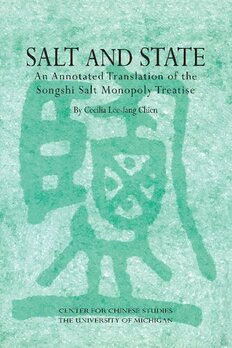
Salt and State: An Annotated Translation of the Songshi Salt Monopoly Treatise PDF
Preview Salt and State: An Annotated Translation of the Songshi Salt Monopoly Treatise
SALT AND STATE AN ANNOTATED TRANSLATION OF THE SONGSHI SALT MONOPOLY TREATISE Cecilia Lee-fang Chien Center for Chinese Studies The University of Michigan Ann Arbor Open access edition funded by the National Endowment for the Humanities/ Andrew W. Mellon Foundation Humanities Open Book Program. MICHIGAN MONOGRAPHS IN CHINESE STUDIES ISSN 1081-9053 SERIES ESTABLISHED 1968 VOLUME 99 Published by Center for Chinese Studies The University of Michigan Ann Arbor, Michigan 48104-1608 © 2004 The Regents of the University of Michigan Library of Congress Cataloging-in-Publication Data Chien, Cecilia Lee-fang Salt and state : an annotated translation of the Songshi salt monopoly treatise / Cecilia Lee-fang Chien. p. cm. — (Michigan monographs in Chinese studies, ISSN 1081- 9053 ; v. 99) Includes bibliographic references and index. ISBN 0-89264-163-0 (alk. paper) 1. Salt industry and trade—China—History. 2. Song shi. Shi huo zhi. Yan. 3. Government monopolies—China. 4. China—History—Song dynasty, 960-1279. I. Song shi. Shi huo zhi. Yan. English. II. Title. III. Michigan monographs in Chinese studies no. 99. HD9213.C42C517 2004 338.4'76644'095109021—dc22 2003055689 ISBN 978-0-89264-163-5 (hardcover) ISBN 978-0-472-03806-0 (paper) ISBN 978-0-472-12750-4 (ebook) ISBN 978-0-472-90145-6 (open access) The text of this book is licensed under a Creative Commons Attribution-NonCommercial-NoDerivatives 4.0 International License: https://creativecommons.org/licenses/by-nc-nd/4.0/ To my mother, Florence Chien, and to the memory of my father, Gabriel Y. T Chien, 1922-2002 CONTENTS Illustrations vii Preface ix Note to Readers xm XV PART ONE: INTRODUCTION Pre-Song Salt Monopolies 4 The Historical Context of the Song Monopoly System 10 Early Salt Monopoly Operations 39 Government versus Merchant Distribution 49 Voucher Programs 62 Southern Song Realities 70 Salt in a Pre-Industrial Command Economy 81 Sources 85 PART TWO: ANNOTATED TRANSLATION Brief Introduction to the Songshi Salt Treatise 93 Section 1: Pond Salt 95 1. Xiezhou 95 Section 2: Sea Salt 141 2. Jingdong 142 3. Hebei 146 4. Liangzhe 156 5. Huainan 183 6. Fujian 241 7. Guangnan 257 Section 3: Earth Salt 275 8. Hedong 275 Section 4: Well Salt 283 9. Sichuan 283 APPARATUS Song Reign Periods 301 Weights and Measures 303 Glossaries Place Names 305 People 313 Salt Monopoly and General Terms 318 Works Cited 330 Index 346 VI ILLUSTRATIONS MAPS Map 1. The Northern Song Empire xvi Map 2. The Southern Song Empire xvii Map 3. Yongxingjun (Shaanxi) Circuit xviii Map 4. Jingdongdong and Jingdongxi Circuits xx Map 5. Jingxibei andjingxinan Circuits xxii Map 6. Jingji and Jingxibei Circuits xxiv Map 7. Hebeidong, Hebeixi, and Hedong Circuits xxvi Map 8. Huainandong and Huainanxi Circuits xxviii Map 9. Qinfeng (Shaanxi) Circuit xxx Map 10. Liangzhe and Jiangnandong Circuits xxxii Map 11. Fujian Circuit xxxiv Map 12. Guangnandong and.Guangnanxi Circuits xxxvi Map 13. Jiangnanxi Circuit xxxviii Map 14. Jinghubei and Jinghunan Circuits xl Map 15. Lizhou, Chengdufu, Zizhou, and Kuizhou Circuits xlii TABLES Table 1. Major Military Developments in the Song 25 Table 2. Pond Salt Production in the Northern Song 99 Table 3. Aggregate Liangzhe Salt Production 157 Table 4. Aggregate Huai Salt Production 183 Table 5. Annual Production of Fujian Salt 241 Table 6. Aggregate Guangnan Salt Production 258 vn PREFACE The rich and unprecedented developments in virtually every aspect of Chinese culture dunng the Song dynasty (960-1279) have inspired scholars to delve into its many and diverse areas. In recent years in China, Japan, and the West the study of the state salt monopoly in the larger context of China's bureaucracy and political economy has generated rising interest.1 My annotated translation and Introduction to the complete text of the salt monopoly treatise in the Songshi, the Song dynastic history, may be seen as part of this effort. Through much of the imperial period, the monopoly stood second only to the land tax in generating revenues, particularly during the Song, when it provided over 50 percent of the state's cash income. Although the Song was arguably China's greatest age, its imperial administration felt fiscal pressures from the start. The government's central dilemma was how to maximize state revenues while improving its people's welfare. In response to ongoing military pressures, Song emperors assumed near complete control over the fisc in general and the lucrative salt monopoly in particular, their efforts arguably achieving the apex of court activism in the imperial era. They prohibited private individuals from trespassing on the state's monopoly revenues and established penalties for those who broke the law; they increased their personal control over financial decision-making by creating offices directly answerable to the throne; they presided over meetings on fiscal affairs and frequently inquired into the state's financial condition; and they had accounting records compiled to keep them informed of the overall fiscal process. Among the number of bibliographies which attest to the growth of the field, see Hans Ulrich Vogel's Bibliography of Works on Salt History Published in China (special issue of the Commission Internationale d'Histoire du Sel, Austria: Berenkamp Verlag Schwaz, 1992), which counts more than 700 titles between 1980 and 1989 and is to be continued for the periods before and after. ix
